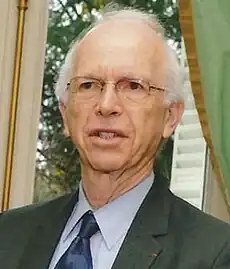Stuart Edelstein | |
|---|---|
 Stuart Edelstein in Nov 2013 | |
| Nationality | American, Swiss |
| Scientific career | |
| Fields | biophysics |
| Institutions | Babraham Institute |
Stuart J. Edelstein (born 1941) is a biophysicist, emeritus professor from the University of Geneva, professeur extraordinaire at the École Normale Supérieure and visiting scientist at the Babraham Institute.
His research focuses on the properties of allosteric proteins, which conformations and activities are affected by the binding of ligands. Using mathematical models and 3D structures, he studied the function of hemoglobin,[1] solving the structure of mutant form leading to sickle-cell disease.[2] He then turned his attention on the allosteric regulation of neurotransmitter receptors,[3] in particular the nicotinic acetylcholine receptors in collaboration with Jean-Pierre Changeux.[4][5]
Life
Stuart Edelstein received a PhD (1967) in Biochemistry from the University of California, Berkeley.[6] After a post-doctoral training at the Pasteur Institute in the laboratory of Jacques Monod, he joined the faculty of Cornell University, where he became professor in 1977. He served as chairman of the Section of Biochemistry, Molecular and Cell Biology from 1978 to 1980.
He was a visiting scientist at the Weizmann Institute of Science (1974) and spent two sabbatical years (1980–1981 and 1984–1985) in Paris as Professeur associé at the University of Paris XII (Créteil) in the laboratory of Jean Rosa and as visiting scientist at the Pasteur Institute
In 1986 Edelstein moved as professor in the department of Biochemistry of the University of Geneva. He was director of the department for the period 1987–1994. He served as president of the Swiss Biophysical Section (1994–1998) and president of the Swiss Committee of the International Union for Pure and Applied Biophysics. He returned to the Pasteur Institute in 1994 for a sabbatical leave in the laboratory of Jean-Pierre Changeux. He held the international chair at the Collège de France for the academic year 2002–2003.
In September 2006, Edelstein became professor emeritus at the University of Geneva. He continued research as a visiting scientist in several academic institutions, notably at the EMBL-European Bioinformatics Institute, the École Normale Supérieure and The Babraham Institute.
Awards and recognition
- 2003, awarded the Legion of honour, rank chevalier
- 1998, elected foreign member of the French Academy of Sciences
Books
- Jean-Pierre Changeux, Stuart J Edelstein. Nicotinic acetylcholine receptors: From Molecular Biology to Cognition. (2005) Odile Jacob ed. ISBN 978-0976890805
- Stuart J Edelstein. Des gènes et génomes. (2002) Odile Jacob ed. ISBN 978-2738111500
- Daniel M Bollag, Michael D Rozycki, Stuart J Edelestein. Protein Methods (1996) ISBN 978-0471118374
- Stuart J Edelstein. The Sickled Cell: From Myths to Molecules. (1986) Harvard University Press. ISBN 978-0674807372
- J M Widom, Stuart J Edelstein. Chemistry: An Introduction to General, Organic and Biological Chemistry. (1981) W.H.Freeman. ISBN 978-0716712244
- Stuart J Edelstein. Introductory biochemistry; fundamentals of cellular metabolism and molecular biology. (1973) Holden-Day.ISBN 978-0816225309
References
- ↑ Stuart J Edelstein. Extensions of the allosteric model for haemoglobin. Nature (1971), 230: 224-227
- ↑ Gene Dykes, Richard H Crepeau, Stuart J Edelstein. Three-dimensional reconstruction of the fibres of sickle cell haemoglobin. Nature (1978), 272: 506-510
- ↑ Jean-Pierre Changeux, Stuart J Edelstein. Allosteric mechanisms of signal transduction. Science (2005), 308: 1424-1428
- ↑ Stuart J Edelstein, Olivier Schaad, Eric Henry, Daniel Bertrand, Jean-Pierre Changeux. A kinetic mechanism for nicotinic acetylcholine receptors based on multiple allosteric transitions. Biol Cyber (1996), 75: 361-379
- ↑ Jean-Pierre Changeux, Stuart J Edelstein. Nicotinic acetylcholine receptors: From Molecular Biology to Cognition. (2005) Odile Jacob ed.
- ↑ "C. V. Stuart J. Edelstein". www.unige.ch. Retrieved 8 March 2014.